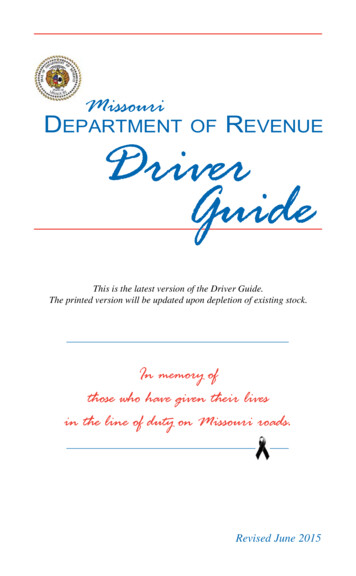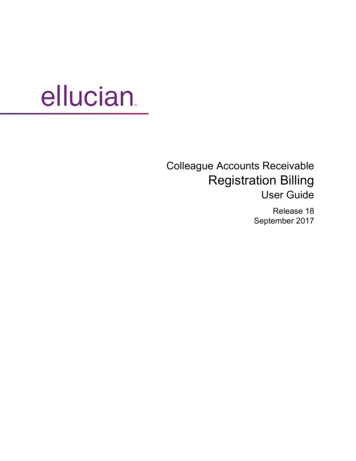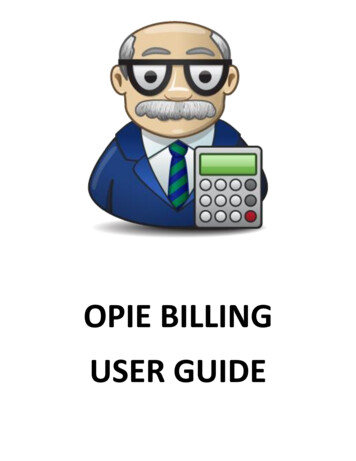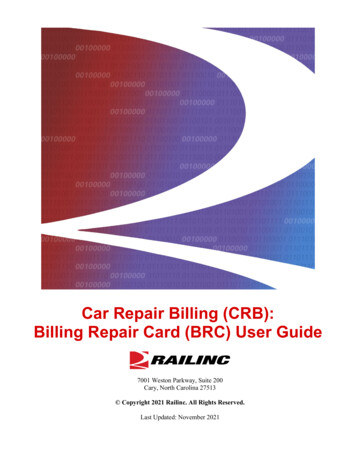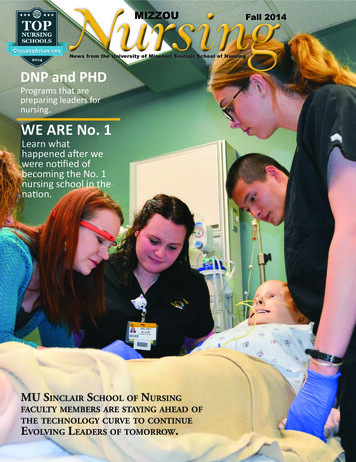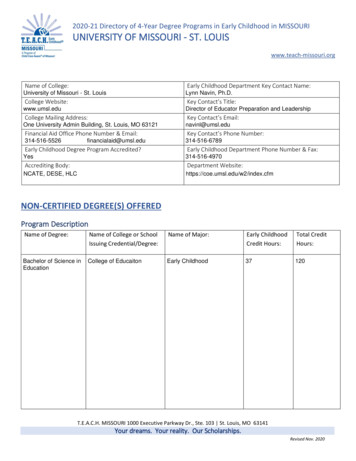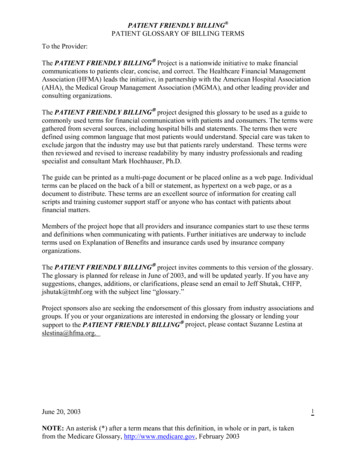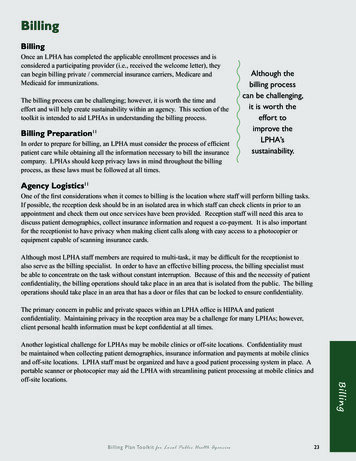
Transcription
BillingBillingOnce an LPHA has completed the applicable enrollment processes and isconsidered a participating provider (i.e., received the welcome letter), theycan begin billing private / commercial insurance carriers, Medicare andMedicaid for immunizations.The billing process can be challenging; however, it is worth the time andeffort and will help create sustainability within an agency. This section of thetoolkit is intended to aid LPHAs in understanding the billing process.Billing Preparation11In order to prepare for billing, an LPHA must consider the process of efficientpatient care while obtaining all the information necessary to bill the insurancecompany. LPHAs should keep privacy laws in mind throughout the billingprocess, as these laws must be followed at all times.Although thebilling processcan be challenging,it is worth theeffort toimprove theLPHA’ssustainability.Agency Logistics11One of the first considerations when it comes to billing is the location where staff will perform billing tasks.If possible, the reception desk should be in an isolated area in which staff can check clients in prior to anappointment and check them out once services have been provided. Reception staff will need this area todiscuss patient demographics, collect insurance information and request a co-payment. It is also importantfor the receptionist to have privacy when making client calls along with easy access to a photocopier orequipment capable of scanning insurance cards.Although most LPHA staff members are required to multi-task, it may be difficult for the receptionist toalso serve as the billing specialist. In order to have an effective billing process, the billing specialist mustbe able to concentrate on the task without constant interruption. Because of this and the necessity of patientconfidentiality, the billing operations should take place in an area that is isolated from the public. The billingoperations should take place in an area that has a door or files that can be locked to ensure confidentiality.The primary concern in public and private spaces within an LPHA office is HIPAA and patientconfidentiality. Maintaining privacy in the reception area may be a challenge for many LPHAs; however,client personal health information must be kept confidential at all times.Billing Plan Toolkit for Local Public Health AgenciesBillingAnother logistical challenge for LPHAs may be mobile clinics or off-site locations. Confidentiality mustbe maintained when collecting patient demographics, insurance information and payments at mobile clinicsand off-site locations. LPHA staff must be organized and have a good patient processing system in place. Aportable scanner or photocopier may aid the LPHA with streamlining patient processing at mobile clinics andoff-site locations.23
Computer Equipment11Electronic billing is the most frequently used form of medical billing today. Paper billing is becoming athing of the past, with the exception of Medicare’s roster billing for mass immunizers, which is commonlyused for seasonal influenza clinics.In order to participate in electronic medical billing, an LPHA must have a personal computer. It isrecommended that the personal computer be relatively new (less than three years old). An Internetconnection is also required for electronic billing in order to access various billing models and insurancecompany web sites.Staffing11Staffing is another important aspect of medical billing. Qualified employees are crucial to implementingand sustaining the billing process. In many cases, existing staff will be required to perform the billingtasks within the agency. It is imperativethat the staff member(s) chosen to takectaon these responsibilities possess theFFastskills necessary to accomplish each taskBilling tasks fall into three categories:involved in the process. These tasks fallreception / intake specialist; credentialinginto three categories including: reception /specialist; and billing specialist. Utilizingintake specialist; credentialing specialist;employees who have performed these tasksand billing specialist.will simplify the billing process.In some instances, all three tasks willneed to be performed by the same staff person. In other situations, the credentialing specialist and billingspecialist tasks may be combined and assigned to one employee and the receptionist / intake specialist tasksassigned to another employee. If it is possible, utilizing employees who have already performed these taskswill greatly simplify the billing process.Receptionist / Intake Specialist11The receptionist / intake specialist is typically the staff person who greets clients when they first arrive at theLPHA. There are specific billing tasks that the receptionist / intake specialist will need to perform, whichmay include: Collecting and organizing patient information into a usable format; Working with a variety of insurance and billing forms; Collecting insurance and other data from clients; Obtaining a copy or scan of client insurance cards; Recording information related to services provided; Obtaining client signatures on required HIPAA and other forms; and Collecting client payments.BillingThe individual performing the receptionist / intake specialist duties should be organized, detail-oriented andpossess good customer service skills.24Bureau of Immunizations
Credentialing Specialist11The credentialing specialist takes care of all credentialing activities for the LPHA. It is unlikely that a singleposition will be created to fulfill these duties. As previously stated, the duties of a credentialing specialistmay be combined with that of the billing specialist.The primary duties of a credentialing specialist include: Credentialing application preparation; Collecting all the required information to be submitted with theapplication; and Following up with insurance companies, as necessary.The staff person performing these tasks should have analytical tendencies,be detail-oriented and possess the ability to meet deadlines and multi-task.Communication skills are also required when performing the credentialingspecialist duties in order to build relationships with insurance companyrepresentatives.Thecredentialingspecialist dutiescan becombined withthat of thebilling specialist.Billing Specialist11The billing specialist is responsible for processing all the LPHA’s claims. This person will enter thenecessary information into the LPHA’s selected billing model. The claim will then be sent to the appropriateinsurance carrier where it will be accepted for payment or denied.If accepted, the LPHA will be reimbursed according to the insurance company’s fee schedule. If the claimis denied, the billing specialist must investigate the rejected claim, verify the information with the insurancecompany and update new details in the billing model for resubmission for payment. This is commonlyreferred to as the “follow-up process” and is a key responsibility assigned to the billing specialist.If all or part of the claim is not eligible for payment, the billing specialist will then need to send a statementto the client. If payment is not received from the client, the LPHA may consider the use of a collectionagency.The primary responsibilities of the billing specialist include: Billing model utilization; Proper coding on claims; Demographic and claim data entry; Claim submission and follow-up; Insurance denials / re-filing claims; Secondary insurance claim filing; Payment processing and posting; Client / patient billing; Collection agencies / write-offs; Patient inquiry responses; and Report generation.Billing Plan Toolkit for Local Public Health Agencies25
Billing Specialist11 continuedThe individual performing the billing specialist duties should be self-disciplined, detail-oriented, organizedand familiar with computer systems and data entry. This staff person should also have good communicationand customer service skills, as they will communicate directly with insurance companies and clients. It isalso beneficial for the billing specialist to be trained in medical coding and medical terminology.Billing DocumentsThe billing process requires the completion of various electronic forms or paper documents. Many billingmodels allow for the documentation to be created and stored in an electronic format. The initial billingmodel training should teach the LPHA staff how to create and/or complete these forms in the individualsystem.Superbill / Charge Ticket / Encounter Form11The terms superbill, charge ticket and encounter forms are generally interchangeable. This is the documentused to record the services being provided to clients. Typically, it is a log sheet where the health careprovider checks a series of boxes to indicate the services provided to the patient and an explanation of whythese services were provided. If the LPHA is using an electronic health record (EHR) system, the superbilldocument will be located on the computer and will be completed by thehealth care provider on the computer. Without an EHR, the same tasks areMany billingaccomplished manually and then the data is manually entered into the billingmodels allow formodel by the billing staff.the creationand storageof electronicbilling documents.All services provided to the client during a visit are reported using a codingsystem. There are four commonly used types of codes: CPT codes,diagnosis codes, modifiers and Healthcare Common Procedure CodingSystem (HCPCS) codes.The codes used to explain what the health care provider did are called CPT codes, which were discussed in the Enrollment section of this toolkit. There are two types of CPT codesused by providers: evaluation and management codes and procedure codes.Evaluation and management codes are used to describe the general patient visit. There are several levelsof evaluation and management codes to designate the time spent and level of decision-making required.Evaluation and management codes are often accompanied by the other classification of CPT code knownas a procedure code. Procedure codes describe specific services that are performed in addition to evaluationand management codes.The superbill should also include modifiers. Modifiers are a different type of numerical code used to covera wide range of topics that add information to the claim to help insurers determine how or whether or not theLPHA should be compensated.Diagnosis codes are used to describe the primary complaint of the patient or why the patient is being seen.The codes can range from sore throat to chest pain. There is a diagnosis code for every possible medicalproblem.26Bureau of Immunizations
Superbill / Charge Ticket / Encounter Form11 continuedHCPCS codes use alpha and numeric characters to describe some drugs.There are coding books that can be purchased in order to aid staff in code selection or verification. There arealso on-line services to answer coding questions such as https://selectcoder.decisionhealth.com/.If the LPHA is using an EHR system, theyshould be sure to include the contents of thecoding list in the set-up of the software. Thiswill make it easy to complete an electronicsuperbill.ctFaFastAll services provided to clients are submittedusing a coding system.If the LPHA does not use an EHR system,the same coding information is used tocreate a paper superbill. Many practices that are not using an EHR use Microsoft Excel to create a customsuperbill. Typically on a paper superbill, the codes are listed with boxes next to them so the provider simplyhas to check the appropriate boxes. The superbill should also contain an assortment of information to helpidentify the patient such as name, address, date of birth and the payment amount collected at the time ofservice. There also needs to be an area to note the place and date of service; both of which are required onthe insurance claim.If the LPHA is planning to conduct off-site clinics to provide immunization services, it will be necessary tocreate a specialized superbill that deals solely with the type of services to be provided.Working with the right documents will help make the workflow run smooth. It also helps assure that thebilling specialist will have all the necessary information for claim filing as well as streamlining the processfor clients.Patient Registration / Demographic Profile Form11It is essential to collect and maintain records of client demographic information. A demographic or intakeform can aid in the collection of client data. Most of the information included on the form will be needed tofile a claim with the third-party payer or help collect funds from clients on denied claims.There are several other forms that are often included with the patient registration form. Since these formsrequire the client’s signature, the forms should be signed when completing the demographic information.These forms include: Authorization of treatment or consent for treatment; Assignment of benefits; and HIPAA Notice of Privacy Practices Acceptance.These documents should be included in the client’s electronic or paper file.Billing Plan Toolkit for Local Public Health Agencies27
Section 317 Funded VaccinesThere are many uninsured and underinsured clients who may seek medical carefrom an LPHA. For many, the LPHA is the only or last available option forhealth care. According to the DHSS, BI Section 317 policy datedAugust 1, 2013, the Section 317 funded vaccine program providesimmunizations for priority populations, including uninsured and underinsuredadults, adolescents and children. This program is available to all LPHAs whoprovide immunizations, which can be administered on or off-site, as long as thecold chain protocol is followed and maintained.The BI Section 317 policy, which includes eligibility information andguidelines, for adult immunizations can be found Adult317Policy.pdf.The BI Section 317 policy, which includes eligibility information andguidelines, for pediatric immunization can be found at diatric317Policy.pdf.Section 317fundedvaccines can beused toimmunizeuninsured andunderinsuredadults, adolescentsand children.For additional information regarding Section 317 funded vaccines, contact the BI at 800.219.3224.Policies and ProceduresIt is important for the LPHA to create policies and procedures relating to the billing process. Written policiesand procedures are vital to the success of billing and should be carefully developed to include all aspects ofthe process. Billing staff should be welltrained on the policies and procedures andthave the ability to refer to them at anyFactsatime to aid in performing their assignedFtasks. The policies and procedures shouldWritten policies and procedures are vital tobe kept up-to-date at all times. The LPHAthe success of the billing program.should update the policies and proceduresimmediately when any changes to theprocess occur.Eligibility Verification11Reading and interpreting the contents of a clients’ insurance card is an important task for billing staff.Information from these cards is needed to determine coverage and co-payments. The information on theback of the card will tell the billing staff where to send the claim for processing and payment. The LPHA’sbilling policies and procedures should require that the receptionist verify the insurance card on every clientvisit.A copy or scan of the front and back of the client’s insurance card should be obtained by the receptionist atthe time of check-in. If a copy of the insurance card cannot be read, the information should be written down.All insurance card copies and/or scans should be checked for readability prior to returning the card to theclient.28Bureau of Immunizations
Eligibility Verification11 continuedAn insurance card could mean that the individual is covered under a fully insured health insurance planregulated by the state or a self-insured employer group that is not regulated by state law. If the individual iscovered under a health insurance policy that is regulated by the Missouri DIFP, the insurance card will say“Fully Insured” on the front. If the card does not state “Fully Insured,” then it is a plan that is not regulatedby the Missouri DIFP. The DIFP recommends providers make a note in their files or billing records in casethere are problems or questions. The DIFP will not be able to assist the LPHA with problems or questions ifit is a self-insured employer group plan, but can offer assistance if the health insurance plan is fully insured.The LPHA may have instances in which a client will present an insurance card that is no longer valid. It isimportant to always ask clients if their insurance information has changed since their last visit. Includingeligibility verification in the billing policies and procedures will aid the LPHA in ensuring client insuranceinformation is as accurate as possible.PaymentsPayments are the desired result of the medical billing process. There are various types of payments that theLPHA will receive through medical billing.Co-Payment and Co-Insurance11Contracts with private / commercial insurance companies often require the LPHA to collect any applicableco-payment at the time of service. The client’s insurance card will reflect the co-payment amount that shouldbe collected. The LPHA’s billing policies and procedures should require the reception staff to request theclient’s co-payment at the time of check-in.Clients may present payment in several forms. The LPHA should be prepared to accept cash, check anddebit/credit card payments. Receipts should be given to clients and payments recorded and balanced withdaily deposits.Receiving Electronic Payments11,22Many third-party payers have transitioned from paper payments to electronic payments. Electronic fundstransfer (EFT) is the electronic exchange or transfer of money from one account to another using a computerbased system. Use of EFT for paying insurance claims may improve cash flow for the LPHA becausedeposits occur immediately.Medicare and MO HealthNet now require that all providers receive paymentsthrough EFT. The LPHA will be required to complete the appropriate forms toestablish the EFT. The Medicare Electronic Funds Transfer (EFT) AuthorizationAgreement can be found at 588.pdf. The MO HealthNet, Missouri Medicaid Audit andCompliance (MMAC) Electronic Funds Transfer (EFT) Authorization Agreementcan be found at 15/07/EFTPaper1.pdf. This form may also be completed and submitted electronically m.action.Billing Plan Toolkit for Local Public Health AgenciesBecausedeposits occurimmediately, theuse of electronicfunds transfer canhelp improvecash flow.29
Receiving Electronic Payments11,22 continuedThe Affordable Care Act (ACA) Section 1104 established the CAQH Committee on Operating Rules forInformation Exchange (CORE) EFT and Electronic Remittance Advice (ERA) Operating Rules, whichrequire that private / commercial insurance companies offer EFT enrollment. At this time electronicremittance is available through private / commercial insurance companies, but is not required.Receiving Paper Payments11The LPHA will receive payments by check from some private / commercial insurance companies and clients.The LPHA’s “pay to” address will be established with each private / commercial insurance company duringthe credentialing process. Paper checks will be sent to this “pay to” address. All checks received should bestamped with a “Deposit Only” stamp upon receipt. Bank deposits should be made on a daily basis.Patient Statements11In some situations, such as a denied claim or failure to collect a co-payment at the time of visit, it may benecessary to send billing statements to clients. Many billing models allow for the generation of patientstatements. Some clearinghouses will offer patient statement processing, which includes printing andmailing the LPHA’s statements. It is important to research all aspects of a billing model prior to selection toensure they offer all the services needed by the LPHA.The LPHA should include information on how they will handle patient statements in their billing policies andprocedures.Recording PaymentsLPHA staff will be required to record all payment types to client accounts. It is important to do this in atimely manner. If it is not done quickly, there is a likelihood that unnecessary follow-up work will be doneby billing staff or inaccurate statements will be sent to the client.Recordkeeping23According to the DHSS Public Health Works Orientation Manual for Public Health Leaders datedFebruary 2014, the Local Records Board of the Secretary of State’s Office is responsible for overseeing themanagement of local government documents for Missouri. Political subdivisions need to follow the Board’sguidelines for the keeping of records. Although the Secretary of State does not have a specific handbook forrecord retention for LPHAs, the Missouri Hospital and Health District Records Manual, issued by the board,is an appropriate guideline for LPHAs to follow and can be found at dHospital.pdf.The Secretary of State’s Office may be contacted for further information or guidance regarding recordretention.Local Records Administrative SecretarySecretary of State’s Office573.751.9047 (phone)573.526.3867 (fax)sosmain@sos.mo.gov30Bureau of Immunizations
Outsourcing11Outsourcing is another option for medical billing within an LPHA. Medical billing companies vary greatlyin their services. Some operate locally, others offer services statewide and some are national or eveninternational in scope. Many options are available for outsourcing, but finding the right medical billingcompany can be challenging. Billing companies are not accustomed to being employed by LPHAs; however,there are companies willing to accommodate LPHA needs.Finding the right billing company requires research. Contact information about the pilot tested billingmodels can be found in the Appendices of this toolkit. An Internet search for billing companies may also bebeneficial.On a national basis, hundreds of medical billing companies are available. A few billing software companiesmake available long-distance billing services that can file claims and process payments.Next Steps / SummaryThere are many steps involved in the medical billing process, which can be broken down into threecategories: preparation; enrollment; and billing. It is important to conduct all the research necessary toimplement an effective billing system. In addition to the multiple resource links within the various sectionsof this toolkit, a listing of web sites that may aid in billing research can be found on page 51 of this toolkit.The LPHA must decide whether or not it is the right time for the agency to begin billing third-party payers.In some cases, billing may not be a sustainable option for an LPHA; therefore, it is imperative to analyze allaspects of the agency and ensure that the capability for billing is available.Preparation Analyze the currentbusiness process Conduct clientassessments Determine LPHA billingneeds Establish feesEnrollment Become familiar withapplicable laws, forms andcodes Choose a billing model Complete thecredentialing andcontracting process withthird-party payers Network with otherLPHAsBilling Hire / assign billing staff Ensure the propercomputer equipment isavailable Create policies andprocedures Begin submitting claimsthrough the chosen billingmodel Receive and recordpayments Maintain client recordsBilling Plan Toolkit for Local Public Health Agencies31
This page was intentionally left blank.
can begin billing private / commercial insurance carriers, Medicare and Medicaid for immunizations. The billing process can be challenging; however, it is worth the time and effort and will help create sustainability within an agency. This section of the toolkit is intended to aid LPHAs in understanding the billing process. Billing Preparation11
